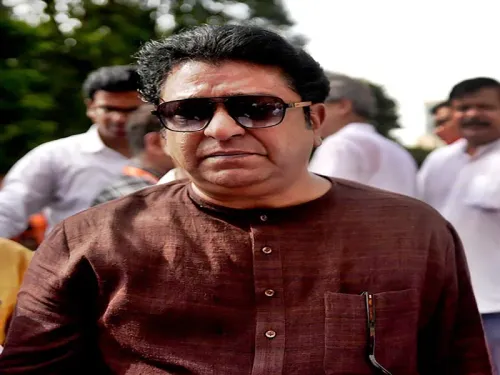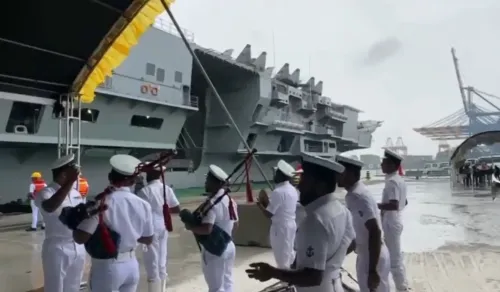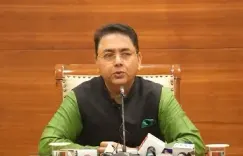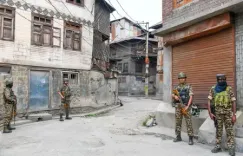How is India Navigating Its Indo-US Relations?
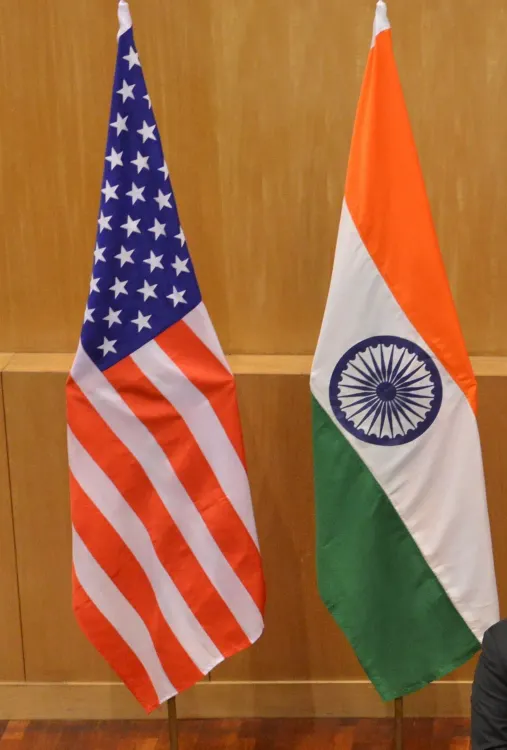
Synopsis
Key Takeaways
- India's geopolitical strategy is evolving in response to global shifts.
- Strategic autonomy is crucial for maintaining India's non-aligned stance.
- Indo-US relations are founded on shared democratic values.
- China's influence remains a key factor in shaping India's foreign policy.
- India advocates for a multipolar world to enhance global stability.
New Delhi, Aug 10 (NationPress) Following the end of the Cold War in 1991 and the subsequent collapse of the USSR, the US emerged as the sole superpower. This pivotal shift compelled India to recalibrate its geopolitical strategy in light of three significant global changes.
Firstly, the US began to set the tone for global dynamics within a unipolar framework, yet for India, as a rising power, the relationship with the US symbolizes a natural alliance between two of the world’s largest democracies, especially in contrast to authoritarian regimes like that of China.
Secondly, India could reasonably anticipate a transition toward a multipolar world in the post-Cold War era, free from the ideological divide between State-controlled Communism and Free Market Capitalism. The Non-Aligned Movement, which India once spearheaded, evolved into a strategy focusing on cultivating bilateral ties with all nations, large and small, grounded in shared security and economic interests.
Finally, India sought to assume a leadership role in the Global South, advocating for peace as a pathway to economic advancement. Strategic analysts must transcend the transient policies of American leadership under Donald Trump or the evolving direction of the European Union and identify emerging geopolitical opportunities that India can leverage without being ensnared by historical legacies.
India maintains a pragmatic understanding of its position within the global economy and military landscape. It recognizes China's strategy of economic ascendance toward becoming the second superpower, having learned from the USSR's downfall, and acknowledges China's newfound alliance with Russia. The specter of a renewed Cold War looms as tensions rise between the China-led bloc and the US; however, China still requires time to reach a level of military parity with the US.
For India, 'strategic autonomy' is more than a mere catchphrase; it represents a commitment to remain non-aligned amidst significant global military conflicts, such as the Ukraine-Russia war and the Israel-Iran crisis, with the overarching aim of promoting world peace. India’s embrace of multipolarity serves not as a strategic weakness but as a robust method for engaging with international relations amid today's geopolitical turbulence.
India is sending a definitive signal to China through platforms like Quad, I2U2, and G20 regarding its alignment in potential US-China disputes. Despite some erratic statements from President Trump, he consistently condemns Islamic terrorism and designates China as the US's primary adversary. Trump's withdrawal from the WHO, citing its China-centric operations, creates common ground for strengthening the Indo-US strategic partnership, notwithstanding the tensions his trade policies and remarks about India’s economy have caused.
However, India must remain vigilant; President Trump appears unaware of the security risks posed by the Sino-Pak alliance, which threatens global peace and particularly India. Trump's attempts to foster relations with Pakistan, historically allied with the Pentagon, seem to be driven by personal ambitions for a Nobel Peace Prize rather than genuine security concerns. Israel's support for this initiative is not unexpected.
The US President has seemingly overlooked Pakistan's harboring of radical Islamic factions, which perceive the US as their primary adversary. He has also failed to recognize the military and technological support China provides to Pakistan amid the recent Indo-Pak skirmishes following the heinous terrorist attack in Pahalgam. India is capable of navigating the unpredictable and transactional nature of Trump’s policies without compromising its national interests, believing that the friendship between India and the US, as leaders of the democratic world, will endure beyond this presidency.
Trump’s ‘America First’ doctrine shapes his strategy to consolidate the US economy, and his interest in Pakistan seems primarily motivated by the desire to secure favorable economic agreements. India has approached issues of illegal migration and trade raised by Trump with rationality. India’s strategy hinges on the sound assumption that the US requires India just as much as India needs the US, allowing India to maintain its stance on reciprocity within Indo-US relations.
India is positioned to adopt a strategy of patience and vigilance, rather than alignment. Not aligning with any existing or emerging superpower constitutes a form of power in its own right. To the US, India may not fit the mold of a traditional ally, but it is indeed an autonomous partner deserving of recognition. This aligns well with India’s image as a significant power whose voice carries weight in global issues concerning war and peace.
Furthermore, during Trump’s presidency, the US reevaluated its security commitments in Europe, affirming that while it remains the world’s dominant power, it no longer maintains a unipolar order. Countries across Africa, Asia, and Latin America are increasingly asserting their agency, making it strategically beneficial for India to position itself as a stabilizing force in the Global South within contemporary geopolitics.
India must closely monitor the Indo-Pacific region, which is currently witnessing heightened competition, a turbulent Middle East, and China’s growing influence in neighboring countries. Ultimately, India should gravitate towards a democratic US in opposition to an authoritarian China that has displayed hostility towards India. Yet, there is no urgency for India to align hastily with the American camp; instead, maintaining an independent stance and readiness to contribute to global peace and welfare aligns with India’s strategic ethos. India’s non-alignment has evolved into fostering bilateral friendships, enabling it to address global hotspots with calls for peace and negotiations.
In conclusion, Indo-US relations must be founded on mutual recognition of the unique significance of their partnership, which conveys a universal message of democracy standing firm against authoritarianism, expansionism, and the use of terrorism to achieve political ends.
India has appropriately intensified its engagement with the Quad as a means of reaffirming the importance of a 'rules-based order' in the Indo-Pacific region. This approach simultaneously counters China's outreach to the Indian Ocean, thereby enhancing India’s maritime security. The Trump administration is dedicated to countering Chinese advances, viewing the Quad as a cornerstone of its Indo-Pacific policy. Hence, India is as aligned with the US on this front as any traditional ally would be.
Historically, India has also supported the US in confronting shared security threats. Notably, following the September 11 attacks, India was among the first nations to join the US-led coalition against global terrorism, while Pakistan required encouragement from President George Bush to join the effort.
The most significant threat to India's national security remains the Sino-Pak alliance, which directs its animosity towards India. The military implications of this strategic partnership have become evident in recent Indo-Pak conflicts. India reserves the right to critically analyze President Trump’s approach, especially if he fails to acknowledge India’s concerns regarding Pakistan in the context of US-China relations.
Trump appears to be accommodating Pakistan, a nation notorious for fostering Islamic terrorism, for the narrow goal of trade, thereby allowing India to balance its defense agreements between the US and Russia while advocating for fair tariffs with the former.
Trump’s advocacy for applying ‘tariff pressure’ on nations trading with Russia, under the premise that they indirectly assist Russia against Ukraine, seems misplaced and can be effectively managed by India through a blend of strategic resolve and diplomatic skill. India has not shied away from labeling Trump’s actions as unfortunate and unreasonable. President Putin should be made aware that India considers its alliance with Russia an integral part of its strategic autonomy.
Simultaneously, India has embraced a strategy of fostering self-sufficiency in defense and the economy, which is prudent under current circumstances, especially as geopolitical divisions and economic fluctuations continue to affect global dynamics.
(The writer is a former Director of the Intelligence Bureau)



